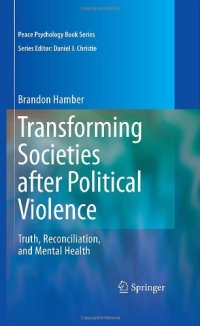
Ebook: Transforming Societies after Political Violence: Truth, Reconciliation, and Mental Health
Author: Brandon Hamber (auth.)
- Tags: Cross Cultural Psychology
- Series: Peace Psychology Book Series
- Year: 2009
- Publisher: Springer-Verlag New York
- Edition: 1
- Language: English
- pdf
It is a momentous day for a nation when war is over or a brutal regime ends. For victims and survivors of political atrocities, it is also a time to process trauma, to anticipate the future, to be heard—and to be healed.
Transforming Societies after Political Violence offers a template for those tasked with providing truth, justice, reconciliation, and healing. This interdisciplinary study identifies complex relationships between recovery from political violence and the psychological processes that accompany widespread social change, showing how these can be integrated to strengthen both individual and society. Author Brandon Hamber draws on his extensive experience in South Africa and comparative examples from elsewhere to examine the centrality of mental health issues in transitional justice, and the social, cultural, and identity issues involved in meeting the needs of victims. In discussing reparations (what the author terms "repairing the irreparable"), the power of ambivalence, and especially concepts of closure, he eloquently sets out professionals’ roles in helping survivors move beyond the toxic past without covering it up or becoming mired in it.
Among the critical areas covered:
- The vital groundwork that must be made before reconciliation can occur.
- Creating context-driven approaches to political and social trauma.
- Assessing truth, documenting the past, and avoiding re-traumatization.
- The role of mental health professionals in truth commission processes.
- Survivors as agents for justice, from civic participation to giving public witness.
- Reparations—symbolic meaning, national value, personal benefits.
- Promoting reconciliation and preventing further violence.
A work that holds profound insight into the meaning of "doing justice," Transforming Transitional Societies is required reading for social and peace psychologists, as well as students and researchers of conflict and peace studies, transitional justice, and intergroup and international relations.
Transforming Societies after Political Violence explores the relationship between the individual and the political and social contexts in which victims or survivors of violence find themselves. The book delves into the complex interplay between individual psychological processes and macro-political interventions such as truth commissions.
During times of political transition, it is vital that there exists a bridge between what takes place at the national or political level and the personal experience of the victim or survivor of political violence. This is where the work in and around transitional justice processes—undertaken by policymakers, survivors themselves, and those working to assist or support them—can be of great benefit. Supporting victims, once they are ready, to be active agents within their environment is critical. In short, the book demonstrates how dealing with the legacy of individual experience of violence and collective processes of peacebuilding can be better integrated to make a lasting peace in societies in transition.